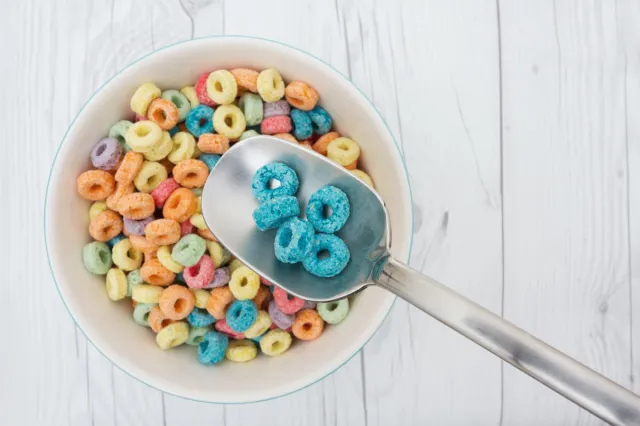11 Foods That Cause Visceral Fat, According to Doctors
You may be eating weight-gaining foods that can specifically cause visceral fat, the dangerous fat that is hidden deep in your abdomen and wraps around your vital organs, and here we’ve ranked them by how bad they are for you. Why? Visceral fat has been linked to some cancers, type 2 diabetes, heart disease, and more; it’s deadly and everyone is at risk, but it’s preventable in many cases with lifestyle choices and avoiding certain key foods.
“Everyone has some amount of visceral fat,” Dr. William Li, bestselling author of the upcoming Eat to Beat Your Diet: Burn Fat, Heal Your Metabolism, and Live Longer, tells us. “It normally makes up about 10 percent of the normal healthy fat that everyone carries around. Fat has many different roles in the body. It is a cushion for your organs, it releases hormones that control your appetite and other brain functions, it is a fuel tank for energy from your food, and it also can be a space heater that fires up to generate heat. In other words, fat itself — including visceral fat — is not bad. But too much of it causes problems.”
Dr. Li adds, “There are some rare genetic conditions that cause excess fat to build up, but mostly the accumulation of too much visceral fat comes from excess energy built up inside the body. This can be the result of multiple factors ranging from overeating (caloric overload) to physical inactivity (not enough calories burned) to disruption of your gut microbiome (which helps to control your metabolism, including the build-up of body fat).”
Diet plays a key role in visceral fat accumulation, so Eat This, Not That! spoke with experts who explain 11 foods that can cause visceral fat and why, and ranked them from bad to the absolute worst. Read to the end to see the number one, and for more, don’t miss 5 Best Habits to Lose Belly Fat and Actually Keep it Off, Says Science.
Shutterstock
Megan Mescher-Cox, DO, who is board-certified in Internal Medicine, Lifestyle Medicine & Obesity Medicine with Dignity Health St. John’s Hospital tells us that most sweetened breakfast cereals are made of refined grains and added sugar. They also have very little dietary fiber as this is removed through the processing.
Think your cereals with dried fruits are better? Think again. “Even seemingly healthy ingredients, such as added raisins or cranberries, can have loads of sugar added before they are combined with the refined grain part of the cereal,” she adds.
“Having this high glycemic food in the morning can serve as a ‘double whammy’ to your health – first by the addition of empty calories with little nutritional value but secondly by causing a spike in your insulin levels, which in turn can cause someone to feel low on energy about 2 hours after eating. This lack of energy leads to less exercise and often a craving to reach for another quick high-calorie item to get a quick energy burst. This roller coaster effect that is produced by peaks and valleys in the person’s blood sugar (and insulin) levels leads to higher calorie intakes and lower exercise levels which is the perfect recipe for visceral fat production,” explains Dr. Cox.
Sign up for our newsletter!

According to Dr. Cox, “[Palm oil is] extremely high in saturated fat, which is known to cause more visceral fat, especially when comparing individuals consuming saturated fats with those consuming polyunsaturated fats.” In one 2014 study, participants who ate muffins made with saturated fat-heavy palm oil gained more fat overall, specifically in their livers and abdomens, compared to those who ate muffins made with polyunsaturated fats from sunflower oil.
“These findings are especially true when a person is also eating more calories than the body needs which is common in the American diet,” Dr. Cox adds.

Dr. Tomi Mitchell, a Board-Certified Family Physician with Holistic Wellness Strategies says, “Frozen coffee drinks are undoubtedly delicious, but if consumed too often, they can have disastrous health consequences. Due to their high sugar content, frozen coffee drinks can cause rapid increases in blood sugar levels which has short and long-term health implications. Additionally, these beverages tend to be high in calories, which, when added up, can cause an increase in visceral fat, a type of interior fat stored around the organs, and can lead to several detrimental medical conditions such as diabetes, heart disease, and stroke. So while they occasionally indulge, frozen coffee drinks shouldn’t be an everyday habit.”

Dr. Cox tells us, “Heavy creams and sugars that are in many crafted beverages contain huge amounts of saturated fats and refined sugar which is a recipe for the development of visceral fat. Many of these drinks have more sugar than an entire day’s recommended amount and sometimes more calories than a typical meal. The excess calories also will be converted into stored fat.”
As an alternative, opt for green, black, or herbal teas. “These teas have health benefits due to their high levels of antioxidants (and they have no sugar, saturated fat, or even calories),” adds Dr. Cox.
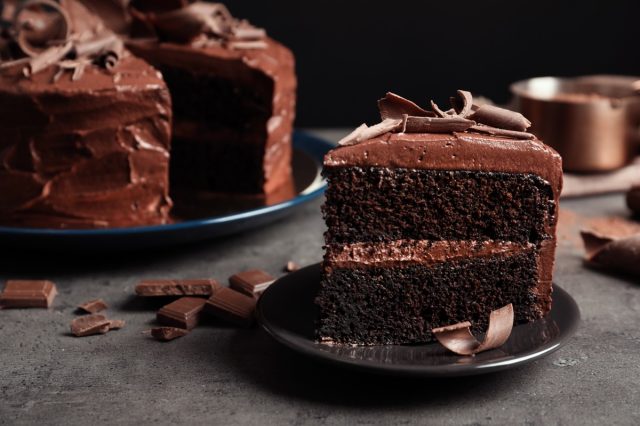
Dr. Cox explains, “This combination of refined sugar with empty calories (empty calories are calories that contribute little to no nutritional value) in cookies and pastries leads to insulin resistance and excess weight, particularly visceral fat. The main source of visceral fat accumulation is excess calorie intake and these foods typically are high in calories, refined grains, and sometimes saturated fats as well with little dietary fiber which would serve to make someone feel full.”
Visceral fat isn’t the only negative side effect of eating these sweets. According to Dana Ellis Hunnes, PhD, MPH, RD, a senior dietitian at UCLA medical center, assistant professor at UCLA Fielding School of Public Health, and author with Cambridge University Press of Recipe for Survival, “Pastries and cookies also often come with a hefty dose of either saturated fat (from butter) or trans fats from margarine or other solid, shelf-stable fat, which are known to raise cholesterol (and LDL cholesterol) levels.”
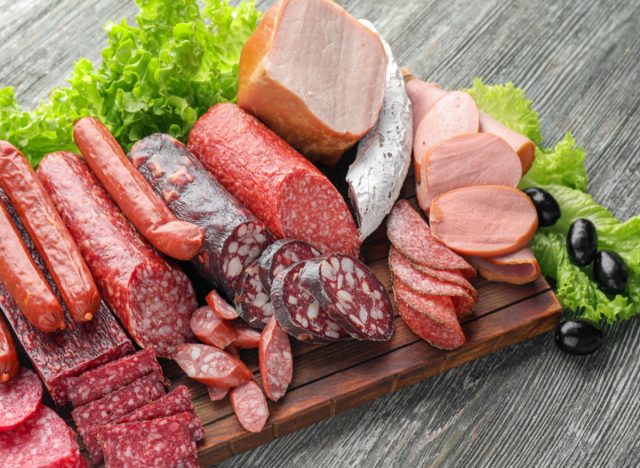
Dr. Stacie J. Stephenson, bestselling author of Vibrant: A Groundbreaking Program to Get Energized, Own Your Health, and Glow, and a recognized leader in functional medicine tells us, “Processed meats, like bacon, sausage, ham, and deli meats, and red meats like beef, especially high-fat cuts like ribeye, have been associated with visceral fat in multiple studies. In a 2020 study, higher intake of meat, in general, was associated with more visceral fat, especially in women over 45 years old. Better choices are protein sources with healthier fats, like seafood, and vegetable protein sources such as legumes.”
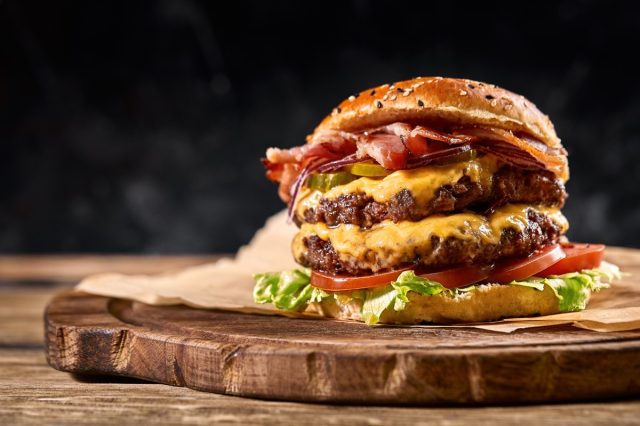
According to Dr. Cox, “Cheeseburgers have a combination of foods that cause visceral fat formation: the high calories, saturated fat, and inflammatory factors from red meat and cheese will produce more visceral fat production and this is often coupled with refined white bread that makes up the bun. Additions of mayonnaise or other spreads further add unhealthy fats to the combination.”
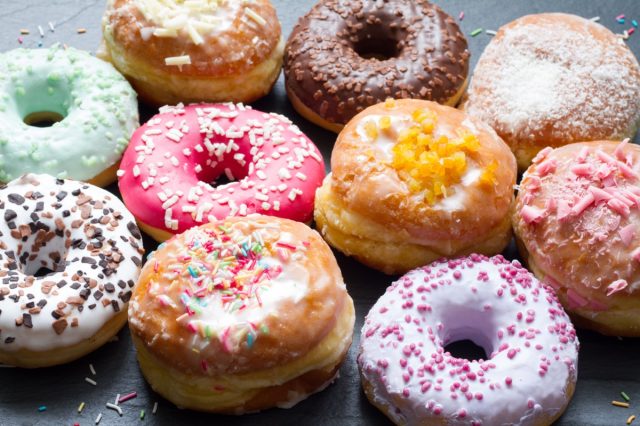
According to Dr. Stephenson, “Refined sugar plus refined fat is a recipe for visceral fat, and doughnuts contain both without any redeeming nutritional qualities like fiber or antioxidants. A 2020 study showed that added sugar intake is associated with visceral fat packed around the heart, and a study of overweight adolescents showed that greater intake of fat and fried foods were associated with fat accumulation around the liver, while greater intake of sugar was associated with increased visceral fat in the abdomen. Doughnuts check all those boxes. How about a bowl of oatmeal for breakfast instead?”
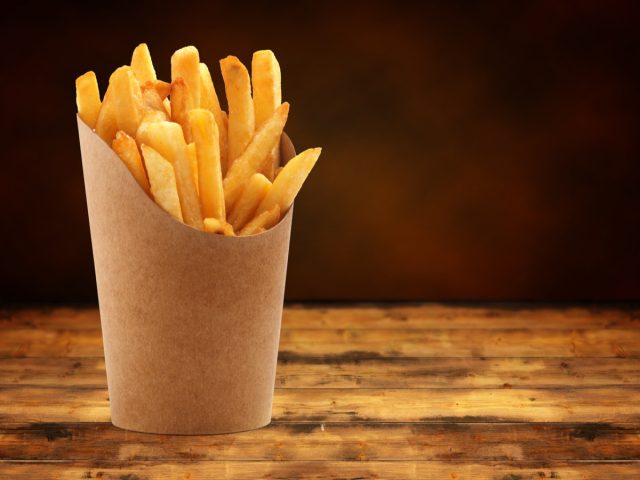
“The next visceral-fat-producing culprit is fried potatoes, whether in the form of potato chips or French fries,” says Dr. Stephenson. “Potatoes are a high-glycemic food, meaning they can cause blood sugar to spike. Deep-fat-fry them and you are adding trans fats—commonly used in frying—as well as carcinogenic acrylamides that form when any carbohydrate-rich food is exposed to very high temperatures, as they are in deep-fat-frying. In a large twin study examining dietary patterns associated with visceral fat, the researchers identified that fried food and fast food were highly correlated with visceral fat. French fries fall into both categories.”
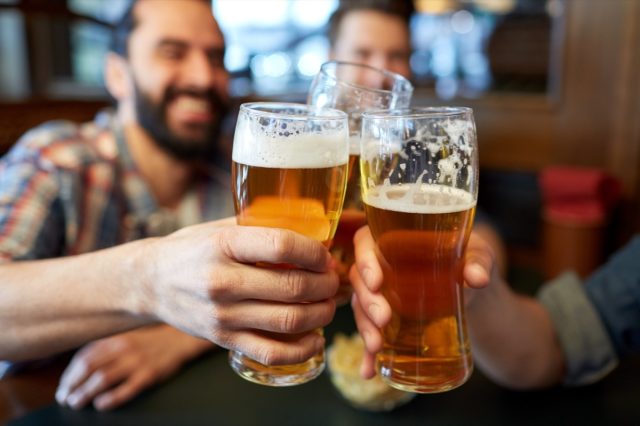
Dr. Mitchell explains, “Alcohol is a popular beverage that many people consume, especially during social situations. It is important to remember, however, that alcohol does have certain health implications. In particular, it can contribute to visceral fat accumulation, which is associated with numerous chronic health conditions, including heart problems and Type II diabetes. To ensure that your imbibing habits remain healthy and safe, consider sticking to lighter drinks with lower alcohol content and limiting your daily intake. You might also explore adding healthier alternatives such as flavored seltzer water or fresh fruit juices when you reach for a drink during social events.”
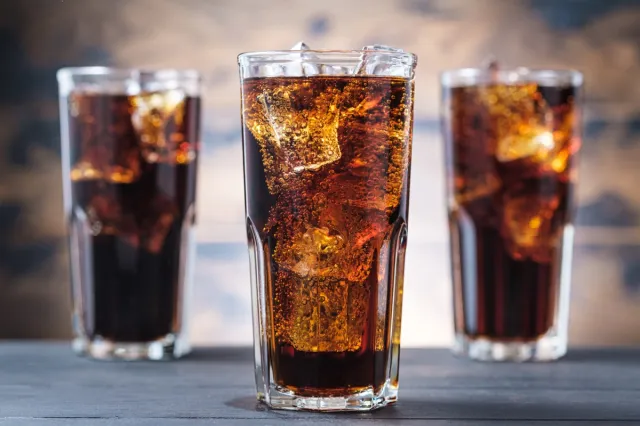
Dr. Stephenson states, “If I had to pick the single worst ‘food’ contributing to excess visceral fat, it would be soda, both the regular kind sweetened with high fructose corn syrup and the diet kind sweetened with artificial sweeteners.”
“Multiple studies have linked sugar-sweetened beverages (the leading source of added sugar in the U.S. diet) with visceral abdominal fat, as well as to an increased risk of diabetes and cardiovascular disease. One study looked at how habitual intake of soda affected fat deposition in healthy adults and showed that sugar-sweetened beverages were clearly associated with greater deposition of visceral fat in the abdominal region,” says Dr. Stephenson.
Sugar-sweetened soda isn’t the only thing you should watch out for, as diet soda has also been linked to abdominal fat. “While some older studies don’t show that diet soda increases visceral fat, a 2021 study showed that adults 65 and over who drank more diet soda did have increased abdominal obesity, and the association was what the study called a ‘striking dose-response relationship,’ meaning that the more diet soda the subjects of the study drank, the greater their abdominal obesity,” explains Dr. Stephenson, adding, “Drinking diet soda may also cause people to think they are justified in eating more because they are ‘saving’ calories on the soda, resulting in a higher caloric intake overall.”
In conclusion, “giving up sugar-sweetened and artificially sweetened beverages could be the single best thing you do for your health,” Dr. Stephenson urges.
No Byline Policy
Editorial Guidelines
Corrections Policy
Source
